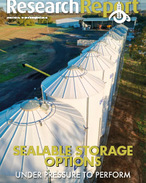This article is 6 years old. Images might not display.
The survey, which covered New South Wales and Queensland, was conducted by Charles Sturt University senior technical officer Dr John Broster, from the Graham Centre for Agricultural Innovation, and Dr Adam Jalaludin, from the Queensland Department of Agriculture and Fisheries (DAF).
The results reinforce the need for integrated weed management to prolong the effective use of available herbicides.
"Herbicide resistance was found in most major weed species, with high frequencies of resistance to Group A and Group B herbicides in randomly collected ryegrass populations in NSW," Dr Broster said in an article in the Grain Research and Development's Groundcover publication.
Ryegrass was only found in NSW so the herbicide resistance screening results for ryegrass apply only to NSW populations.
"Worryingly ... what we found was that ... Roundup (glyphosate) resistance in ryegrass ... in northern NSW was 10 per cent and south of Wagga Wagga towards the Victorian border it was 12 per cent," Dr Broster said.
In these regions, he said more ryegrass populations were resistant to glyphosate than to the Group A herbicide clethodim.
Dr Broster said this means growers with confirmed glyphosate resistance who wish to plant summer crops and fallow paddocks during winter will have to rely on alternative knockdowns.
But the good news, according to Dr Broster, is that every weed species still has some herbicides that work on all sample populations.
Nonetheless, he warned against relying on one herbicide group alone because it hastens the development of herbicide resistance.
"We've got to maintain the herbicides that work by using non-herbicidal weed management tactics, in conjunction with our herbicides, to ensure their effective life for as long as possible."
Dr Broster said the random survey showed 67 per cent of NSW ryegrass samples were resistant to Group A ('fop') herbicides.
In addition, significant levels of resistance were found to Group B sulfonylurea ('SU') and imidazolinone ('imi') herbicides with more than 50 per cent of populations affected.
Less than 10 per cent of ryegrass samples were resistant to 'dim' and Group D herbicides; and only six per cent of ryegrass samples were resistant to one or both of these herbicide chemistries.
No ryegrass samples from the NSW survey were resistant to Group J or K herbicides.
The results showed a significant number (38 per cent) of wild oat populations were resistant to the Group A 'fop' herbicides and 54 per cent of sow thistle populations surveyed from central and southern NSW were resistant to Group B 'SU's.
A podcast of the survey can be found at: http://bit.ly/2Xwri2O























